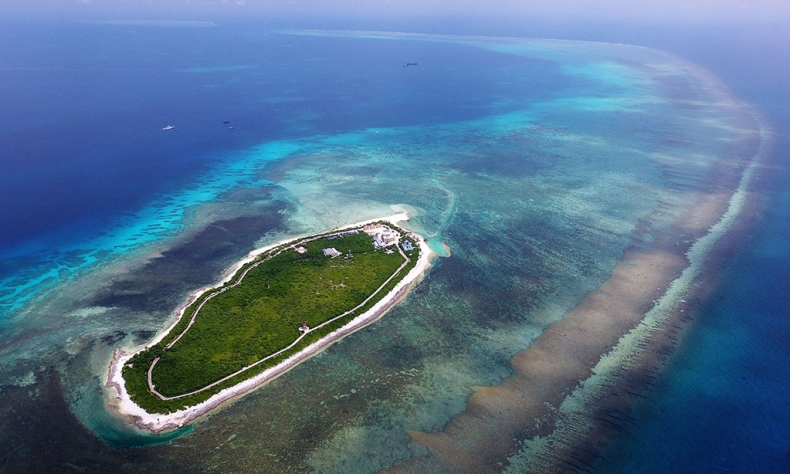US Bias on China’s Maritime Claims in South China Sea

The American statement on the maritime claims regarding the South China Sea not only portends more worrying external interference in the region, but also unwisely misleads other littoral countries in the South China Sea to distrust and even antagonize a neighboring giant country.
As soon as the statement of U.S. Secretary of State Mike Pompeo was released, the U.S. Position on Maritime Claims in the South China Sea triggered a sensation among the countries surrounding the sea and beyond.
The statement, clearly signifying that the United States had chosen its side regarding rival claims, is nothing more than biased stance on China’s legitimate maritime claims in the South China Sea.
It claims to share with the rest of world a “common interest” in the South China Sea. However, given that the United States lies well outside the region, this statement sounds somewhat bizarre to those inside.
After all, it is difficult for a country outside the region to understand the history of the people-to-people intercourse underway for many centuries in the South China Sea, and their shared values even in the face of competing interests.
One immediately recalls the 19th Century Monroe Doctrine in which the U.S. warned off European powers seeking to challenge its paramount position in determining affairs in the Americas.
The present U.S. position on the South China Sea is allegedly based on international law, i.e., the United Nations Convention on the Law of Sea (UNCLOS). It is interesting to note that the United States is not a signatory to this document.
Therefore, it’s somewhat baffling to find a non-contracting state trying to convince those who have signed up to accept its position based on its outsider’s interpretation of the convention.
It becomes even more curious when one realizes that the United States for ages had been sticking to a policy of neutrality on competing claims in the South China Sea, which seems to suggest it was up to the countries directly involved to sort out their competing claims. That stance suddenly seems to have been abandoned.
Again, the timing of this political move is also quite intriguing. The statement was not made at the very beginning when the claims of the coastal countries in the South China Sea became known to the outside world. It was even not made at the time an internal arbitration tribunal rejected China’s claim.
Instead, it was made when the tension has accumulated to its height in the South China Sea for the routine yet often highlighted patrol in the waters by the U.S. Navy.
If one is curious enough to probe more deeply into this statement, then one finds it is basically blind to the history of the South China Sea, and based merely on selective interpretation of the UNCLOS, as a means to achieve American geopolitical goal against China.
Firstly, China’s maritime claim is based on historical evidence. There is no need to go back to ancient times when Chinese people harnessed the riches of the South China Sea for living and Chinese officials exercised clear jurisdiction over the region.
It will suffice to mention how the Chinese government, in the immediate aftermath of the Second World War, re-claimed and resumed control over the various islands and islets in the South China Sea, and how the famous dash lines denoting maritime territorial boundaries were drawn up without opposition of any country, if not, indeed, with the actual encouragement by the United States – it was the U.S. that provided the military vessels patrolling the South China Sea in those early days.
Secondly, compared with the long history of Chinese activities in the South China Sea, the UNCLOS emerged as a result of the recent endeavor to institutionalize the law of the sea. As a general principle of international law, it should be interpreted in good faith.
Unfortunately, the South China Sea arbitration tribunal totally disregard these elements in the face of disputed jurisdictional claims. For this reason, among other things, the award has been boycotted by the Chinese government.
With or without the arbitration award, a due account of history does no harm to the furtherance of the principle. The U.S. position statement is a full-throated endorsement of the controversial award without looking into the true merits of the UNCLOS rules vis-à-vis the specific history of the South China Sea.
Thirdly, the betrayal of the American longstanding neutral position is naturally viewed as an attempt to sow discord between China and other littoral countries, and a political move with geopolitical implications.
As a matter of fact, China and ASEAN countries (including those abutting the relevant waters) are in the process of negotiating a Code of Conduct of the Parties in the South China Sea (COC), which can be viewed as a body of special rules for the region to supplement the international law of the sea. Needless to say, the COC is expected to further promote peaceful cooperation among China and other littoral countries in the South China Sea, but the U.S. position statement will serve no role other than a discouraging one to early conclusion of the COC.
Moreover, it is no secret that the United States views the South China Sea issue as a lever to contain China. Its position statement is conveniently used as a tool, which also lends “legitimacy” to its ever-increasing regional military presence.
To conclude, the American statement on the maritime claims regarding the South China Sea does not help countries in the region to manage their competing claims and promote stability of the region.
It not only portends more worrying external interference in the region e.g., in the form of military operations, but also unwisely misleads other littoral countries in the South China Sea to distrust and even antagonize a neighboring giant country.
Professor Kong Qingjiang is dean of the School of International Law, China University of Political Science and Law.
 Facebook
Facebook
 Twitter
Twitter
 Linkedin
Linkedin
 Google +
Google +










